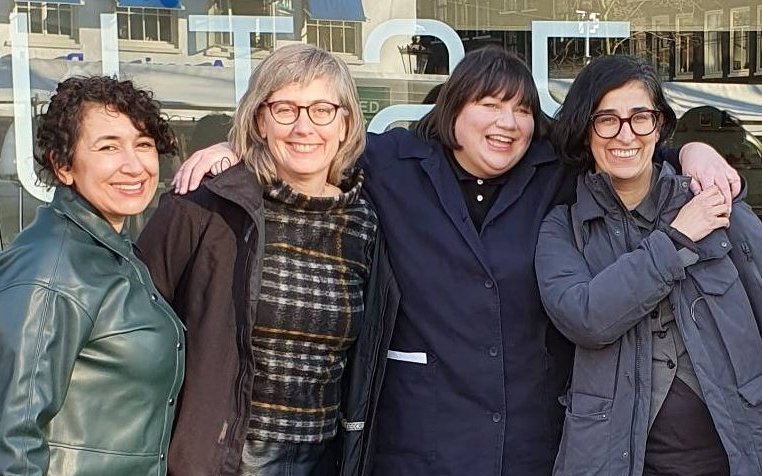About us
The Institute appeared in March 2020 as a bugreport. We decided to bring together our resources and build a temporary institution that can address, engage in and resist the disruptive and inequitable impact of complex global technology regimes and infrastructures. We meet regularly to discuss current developments, develop research threads, respond to questions from colleagues and comrades, and work on commissioned projects. We are registered as a non-profit association in Brussels, Belgium.
An overview of the activities of the Institute is here and you can find work in progress on our wiki.
Funding
Our current work on Digital infrastructures and the reconfiguration of sovereignty and imagined communities (SoliXG) is funded by CHANSE (Collaboration of Humanities and Social Sciences in Europe) and UKRI-AHRC (UK Research and Innovation, Arts & Humanities Research Council). Previous research has been funded by: Human Data Interaction: Legibility, Agency, Negotiability’ Network Plus, UK EPSRC and Research Communities Funding: COVID-19 / Quintin Hogg Trust.
Partners
The Institute for Technology in The Public Interest is associated with Friends of the earth Europe, The Underground Division, Our Data Bodies, Constant, Citizen Sense, CS and Regenerative Energy Communities.
Board-members

Miriyam Aouragh
Reader at Communication And Media Research Institute (CAMRI) at the University of Westminster, London.
Miriyam began research about the implications of the internet in Palestine. She studies techno-political evolutions during outbreaks of mass revolts in the Middle East and North Africa (Second Intifada 2000, the Arab Uprisings 2011, the Second Wave protests 2016). She received the Rubicon grant in 2009 and a Leverhulme grant in 2011, she continued to research the counter-revolutionary and imperial role of internet and technology. As a media anthropologist, she combines ethnographic offline methodologies (long term participant observation and interviews) with critical theory and media analyses. Her work is published in several books and journals including her own monographs Palestine Online (IB Tauris 2011) and her forthcoming Mediating the Makhzan (2021). She teaches Middle East politics, Critical theory of the internet and Global media. She is a member of the editorial board of Historical Materialism.
Seda Gürses
Faculty of Technology, Policy and Management, TU Delft.
Seda is a member of 'the Institute' and Constant, as well as a member of the faculty in the Department of Multi-Actor Systems at TU Delft. Her work focuses on privacy enhancing and protective optimization technologies (PETs and POTs), privacy engineering, as well as questions around software infrastructures, social justice and political economy as they intersect with computer science. She is also a member of the team that developed DP3T, one of the proposals for COVID-19 Contact Tracing Apps. http://vous-etes-ici.net
Femke Snelting
Femke develops projects at the intersection of design, feminisms, and free software. In various constellations she explores how digital tools and practices might co-construct each other. She is member of Constant, association for art and media based in Brussels. Constant generates performative publishing, curatorial processes, poetic software, experimental research and educational prototypes in local and international contexts. With Jara Rocha she activates Possible Bodies, a collective research to interrogate the concrete and at the same time fictional entities of bodies in the context of volumetric technologies. With the Underground Division (Helen Pritchard and Jara Rocha), she studies the computational imaginations of rock formations. Femke teaches at XPUB (experimental publishing master, Rotterdam). http://snelting.domainepublic.net
Helen V. Pritchard
Institute for Experimental Design and Media Culture, University of Applied Sciences and Arts Northwestern Switzerland FHNW, Basel/ University of Plymouth
Helen’s work considers the impacts of computation on social and environmental practice and how these impacts configure the possibilities for life—or who gets to have a life—in intimate and significant ways. As a practitioner they work together with others to make propositions and designs for computing otherwise. With TITiPI they are the co-principal investigator on the CHANSE funded project ‘SOLiXG’, and co-investigator on the Swedish Energy Agency project ‘Regenerative Energy Communities’, working at the intersections of energy design and agro-ecology. They are the co-editor of ‘Data Browser 06: Executing Practices’ (2018) and ‘ Sensors and Sensing Practices’ (2019) and the forthcoming (2023) anthology ‘Plants by Numbers: Queer Feminist Technoscience’. http://www.helenpritchard.info/
Associated member
Jara Rocha
Jara Rocha works across the situated and complex forms of distribution of the technological, with an enby, antifa and trans*feminist sensibility. They tend to find themselves in tasks of remediation, edition, action-research and in(ter)dependent curatorship. Their main experimentation areas have to do with contemporary semiotic-material conditions of possibility. With Femke Snelting they published "Volumetric Regimes: Material Cultures of Quantified Presence" (Open Humanities Press, 2022), and also together with Helen V. Pritchard they work on the projects The Underground Division and Queering Damage. With Karl Moubarak and Cristina Cochior they conform the Cell for Digital Discomfort (BAK fellowship 21-22). Jara is an associate member of The Institute for Technology in the Public Interest. They live in Barcelona, where they teach at EINA and ESCAC and hold the 2023 Fellowship by Hangar/La Virreina with a project called LaaS (Life as a Service). They are part of the curatorial board at La Capella and their show “Naturoculturas son disturbios” emits erratically from local Dublab radio. http://jararocha.blogspot.com/
Website built with Pico CMS. Font: Work Avec, OSP